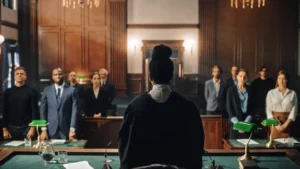“Pornography Law in Washington” Possession and viewing are the two types of child pornography offenses that are prosecuted in Washington. Just what does that imply? In general, you can break the law if you intentionally have photos of sexually explicit behavior involving a juvenile in your hands or are just viewing them.
Second-degree and first-degree laws make up the remaining division of the laws (see explanation below).
One of the worst sentences in the nation for child pornography convictions in Washington State includes jail time, fines, a criminal record, and registration as a sex offender.
Pornography law in Washington: How about freedom of speech?
The Constitution does not recognize child pornographic images as free speech. On the other hand, child pornography involves the sexual exploitation of children. Nowadays, child pornography is more common online and even on smartphones, where called “sexting.” Registration on the Washington Sex Offender Registry is the result of the majority of convictions. Once registered, a person may remain on the list indefinitely.
Observation and possession convictions
RCW 9.68A contains criminal law provisions addressing child pornography. Under these statutes, a charge can lie against a person who knowingly owning and/or purposely viewing “sexually explicit images” that contain child pornography.
The following offenses apply:
- Possession of images showing children acting in a sexually explicit manner as well as watching such images. Hence, the law prohibits both acts.
- Each offense is classified into two degrees, with first-degree accusations being the most serious.
First-degree possession or viewing offenses include the following sexually explicit behaviors or images:
- Sexual contact between people of the same sex or different sexes, or between humans and animals, including genital-genital, oral-genital, anal-genital, or oral-anal contact
- Any item entering the vagina or rectum,
- Molestation,
- abusive sadomasochism, or
- Urination or defecation for the viewer’s sexual gratification.
A second-degree possession or viewing crime includes any of the following sexually explicit behaviors or images:
The depiction of any minor’s genitalia, pubic, or rectal regions in public, or the breasts in public for a female minor, or
Touching a person’s pelvic region, buttocks, or breast region—whether they are wearing clothing or not—in order to arouse the viewer’s sexual interest.
Regarding the first category of materials, it should be noted that it is not essential for the minor to have been aware of any aspect of the activity being portrayed.
For the purposes of these statutes, “minor” means any individual who is younger than the age of 18.
Pornography law in Washington: Federal Offenses for Child Pornography
Federal law also prohibits the use of child pornography. The following federal statutes apply to child pornography:
Child pornography (sexual exploitation of children) under 18 U.S.C. 2251
Selling and Buying of Children Under 18 U.S.C.
Possession, distribution, and receipt of child pornography are among the prohibited activities by 18 U.S.C. 2252.
Also, 18 U.S.C. 2252A prohibits certain acts related to or including child pornography.
18 U.S.C. 2260 forbids the creation of sexually explicit pictures of minors for importation into the United States.
Child pornography’s legal restrictions
Possession isn’t always obvious. The accuser must have willfully acquired the pornographic material, according to the prosecution.
This can be challenging to demonstrate in the case of digital content. Images or videos may download onto a person’s computer or phone in a number of ways without their knowledge. Such ways include when they click on a malicious link while scrolling through a questionable website, and when such images lurk in a browser’s temporary files. Besides, malware might use the victim’s device to spread the material.
Law enforcement frequently uses aggressive sting operations to catch those who are accused of having child pornography. Even though they frequently don’t pass legal muster, such operations can have terrible repercussions for innocent people.
The possession or viewing of child pornography is a grave, irreparable crime. Avoiding shady websites and not clicking on links from unauthorized or unreliable sources is your best line of defense.
FAQs about pornography law in Washington.
The following are FAQs concerning the pornography law in Washington.
What Does “Promoting Pornography” Mean?
A person is guilty of promoting pornography if they sell, exhibit, display, or produce any lewd material with the intent to make money.
The term “lewd matter” refers to material that explicitly depicts or describes representations or descriptions of actual or simulated sexual acts, masturbation, fellatio, cunnilingus, bestiality, excretory functions, or lewd exhibition of the genitalia or genital area, violent or destructive sexual acts, and that, taken as a whole and in the context in which it is used, lacks serious literary, artistic, political, or scientific value.
What will the penalty be?
Pornography promotion is a class C crime. A class C felony carries a maximum five-year jail sentence, a maximum $10,000 fine, or both.
It is crucial to have skilled legal counsel who can fight for the lowest penalty feasible for you because the punishment ranges so considerably.
Related article:



